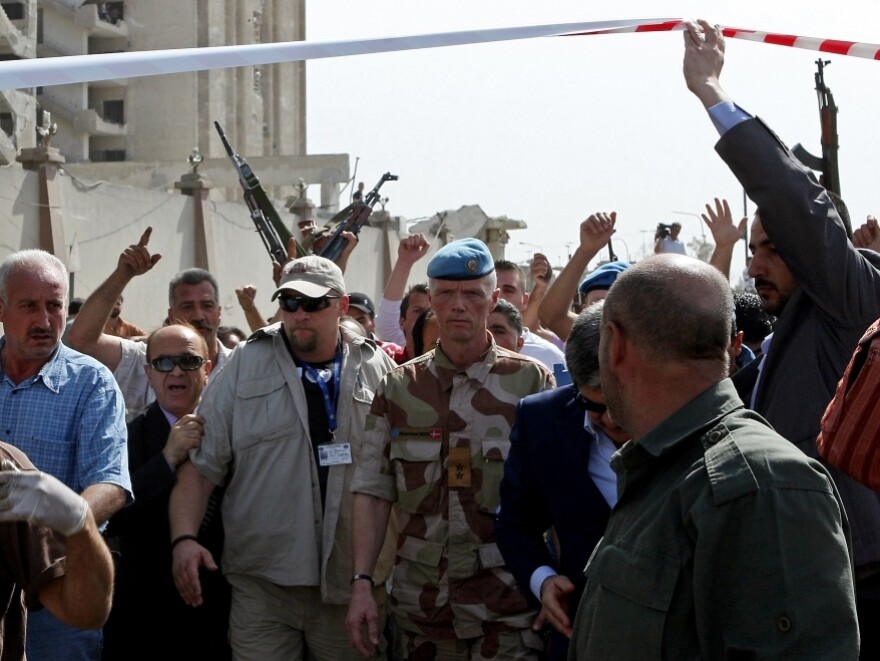The international peace plan for Syria is nearly a month old, and signs are pointing to a conflict that is becoming even more entrenched.
I believe that the U.N. supervision mission is possibly the only remaining chance to stabilize the country. There is a profound concern that the country could otherwise descend into full civil war, and the implications for that are quite frightening.
In the latest blow, two massive explosions rocked the outskirts of Syria's capital, Damascus, on Thursday, killing at least 55 people and injuring hundreds more.
The peace plan, sponsored by the U.N. and the Arab League, called for the Syrian regime and opposition groups to honor a cease-fire and begin a political dialogue. Yet hundreds of people have been killed in the past month.
The Syrians are still limiting access for foreign journalists, but just a few minutes on YouTube offers a sense of ongoing fighting.
One recent video shows opposition rebels fighting in the Syrian town of Rastan. What's most striking about the video is that it exists. Until now, the rebels rarely appeared in videos uploaded to YouTube by Syrian activists. And when they were shown, they covered their faces.
Now, the group is in full view, firing AK47s out the window of a house, presumably at government soldiers.
That's not all. Government troops have been attacking residential areas in several cities around Syria this week.
Failing Plan, Worse Alternatives
Kofi Annan, the envoy to Syria for the U.N. and the Arab League, gave a grim report to the U.N. Security Council this week on the peace plan and the U.N. mission. But he said as many times as the cease-fire has been violated, he is not seeing any other viable options to end the violence.
"I believe that the U.N. supervision mission is possibly the only remaining chance to stabilize the country," Annan said. "There is a profound concern that the country could otherwise descend into full civil war, and the implications for that are quite frightening."

The U.N. plan is most publicly supported by the Russians, who believe there is still a way to mediate an end to the crisis in Syria. The Russians, long-time allies of the Syrian government, have opposed strict U.N. sanctions and calls for foreign intervention.
But a growing number feel the peace plan has failed.
They include Wissam Tarif, who runs the Beirut office of the activist group Avaaz, which does extensive work on Syria. He and others say the Syrian regime is simply not willing to stop the violence, which means it will never be able to reach a negotiated solution.
That's why Tarif calls the U.N. plan a "necessary failure" — meaning that the more the Russians see the regime's violations, the more likely they will be to go along with tougher measures against the Syrian leadership.
"Having said that, it's very important to note that this failure is very expensive and it's by the Syrian people's blood because hundreds continue to be killed in the country," Tarif says.
No Agreement On Alternatives
The problem is there's no consensus on what to do next.
Anne-Marie Slaughter, a professor of politics and international relations at Princeton who formerly headed the State Department's policy planning office, says there are many reasons the U.S. has yet to come up with its own plan on how to resolve the crisis.
First, Syria's neighbors are divided over whether the regime should stay or go. Next, there's no clear choice of who would lead Syria if President Bashar Assad is ousted. And, the U.S. doesn't want to be responsible for another intractable conflict like Iraq or Afghanistan.
Still, Slaughter says, the U.S. will likely get dragged into Syria anyway, once the violence on the ground is just too much to ignore.
"I understand what we're afraid of, but at some point, the status quo is going to become worse than any of our fears. And at that point, we're going to have to act," Slaughter says. "The problem is no one can see exactly what that point is."
So rather than wait until that unknowable point, Slaughter and other analysts say the U.S. should come up with a plan now.
Copyright 2021 NPR. To see more, visit https://www.npr.org.



